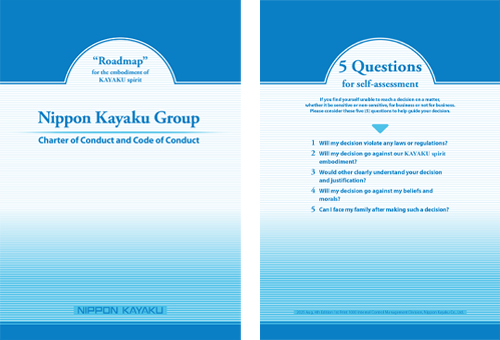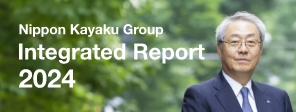With the installation of its Internal Whistleblowing System and the setting up of its Compliance Hotline, Nippon Kayaku is working on prevention and early detection of unfair practices, and relevant corrective measures.
Our Compliance Hotline is available to all domestic Nippon Kayaku Group executives, employees (including contracted and part-time employees), temp staff and retired employees (up to a year after they have left). Overseas Group companies, meanwhile, have set up their own internal whistleblowing systems.
Whistleblowing reports may pertain to malpractice, such as law violations, unjust practices, violations of internal regulations such as the Group Charter of Conduct and Code of Conduct, and actions contravening corporate morals. They may also pertain to human rights violations, harassment, bribery, unfair trading, and more generic corrupt practices. When it comes to malpractice, or the risk of malpractice occurring in Nippon Kayaku Business, we are ready to accept a whistleblowing report or consultation at any time.
Our Compliance Hotline, meanwhile, runs to both our Ethics Committee Office (the Internal Control Management Division’s Compliance Manager) and an external law firm, and allows whistleblowers to choose anonymity or otherwise when reporting or consulting. Reports may be made via telephone, email, document or interview, with email and document submissions accepted 24/7.
Any report or consultation accepted by the Compliance Hotline reception desk will be examined by the Ethics Committee Office, which will then decide on whether to investigate the facts. If, during any investigation, evidence of malpractice becomes clear, the Ethics Committee Office will promptly devise measures for corrective response and recurrence prevention, and subsequently notify the whistleblower of the investigation results.
Our Internal Whistleblowing System guarantees both confidentiality and anonymity, and our Regulations on Handling Internal Whistleblowing Reports specifically state that the whistleblower shall not receive any kind of negative treatment as a consequence of reporting or consulting.
We are raising awareness of our whistleblowing system and Compliance Hotline through group sessions, E-learning, internal portal site announcements, workplace posters, and the distribution of portable cards.
Contents of Reports and Consultations made over the Last Five Years
FY2024 saw a total of 25 reports(non-consolidated: 17; group companies: 8)and consultations made, with the facts of every one investigated and corrective measures deployed where necessary. Of those 25, none were of sufficiently critical nature to impact business operations. Through internal company training will we continue to promote awareness of our Internal Whistleblowing System, and encourage employees to use it as we strive towards prevention, early detection and containment of malpractice and misconduct.




